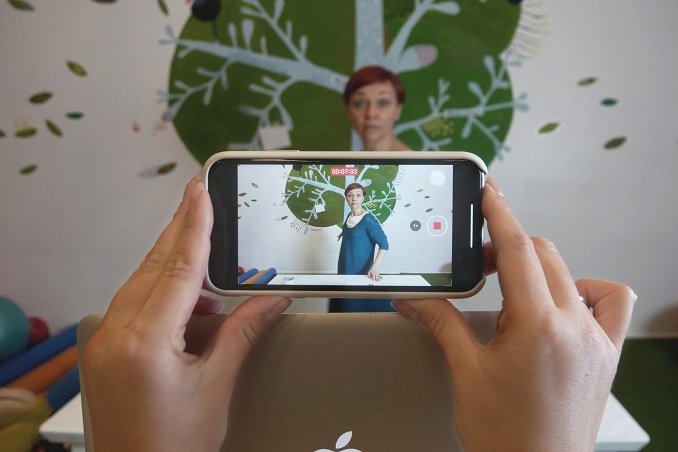
It is almost 10 am, and we are about to start. As the lights turn on, Rūta and Rūta (Rūta is one of the most famous names in Lithuania) jump to the stage for their first-ever live-stream broadcast. Despite neither of them is a professional performer, starting today they are compelled to carry out a two-hour transmission five days a week.
It’s not as if theatricality was entirely unknown for either Rūta. You have to display some sort of showmanship if you want to work at a kindergarten. However, for both Rūtas and the Mažųjų Valdos Academy becoming a streaming-type of business seemed a little far-fetched just a week ago.
A poorly coordinated first message
“We heard the media talking about schools being shut down on Thursday morning, but the official government’s order came later that evening,” told me Renata Lazdin, founder and owner of the academy. “We immediately met with the leading staff to discuss how to proceed. Funny enough, our first question was: What are we going to do with our kids? as we are all mothers ourselves.”

Renata’s team was not alone in their confusion. When the restriction measures were announced, local and national authorities seemed to lack some coordination. Vilnius mayor’s office called for a five weeks shut down in opposition to two weeks recommended by the central Government. Although eventually, the mayor’s office rectified, this brief lapse of misinformation raised concerns.
Going online
“Short after the announcement, we were flooded with calls from parents asking how we were going to handle this situation. We were discussing alternatives while at the same time answering phone calls” said Renata. On their address, authorities encouraged schools to continue working using online platforms; however, this does not work the same in all cases.

Contrary to public schools, small private organizations such as Mažųjų Valdos work just like any other small service-based business. On top of that, e-learning, according to Renata, is harder for toddlers as their attention span is significantly shorter than for older kids.

Furthermore, going online can be challenging if you don’t have any previous experience. Adjusting the classes to fit into a long-distance learning format is just half of the problem, simultaneously there are some basic technical issues you need to deal with, choosing a platform, installing the equipment (if you have any) and instructing your audience on how everything is supposed to work.
“We were a little worried; customers do not want to pay for services they are not receiving. But as you noticed is not as if we were immediately prepared to set everything up. Nonetheless, we felt like if we did not provide parents with a realistic alternative fast, they would stop making their payments or, even worse, demand a refund. Losing some income is bad, being forced to repay all of our customers could turn out deadly.” says Mažųjų Valdos’ director, Karolina Sugnit.
Governmental Action
Many small businesses have found themselves in a similar situation after the quarantine came into force. Although there have been many manifestations of solidarity in this regard, that is not always the case. According to Karolina, “At that point, you also start thinking about the whole team. You can’t stop paying your employees, and you don’t want to let anyone down.”
The Lithuanian Government is not entirely oblivious to the dire times ahead. In consequence, it announced a number of measures to help businesses alleviate some of the crisis’s worst effects. Among the measures, the government pledge to cover up 60 per cent of any worker’s downtime cost. The plan also contemplates rescheduling tax payments for businesses affected by the coronavirus.
Dealing with the “new” normal
By the end of that first meeting, Mažųjų Valdos’ team decided to announce that starting on Tuesday morning, they were going to broadcast their classes live, regardless of the technical inconveniences. Ultimately their decision is not motivated on financial grounds. Renata comments that “Education is not only a business and not everything is about money. For us, it is important not to lose the bound that we have with the kids.”

Once the first streaming is over, some parents send images of their kids enjoying the show and provided some feedback. Both Rūtas are taking notice. As the quarantine stands, it seems like they will have enough time to improve.

Be the first to comment